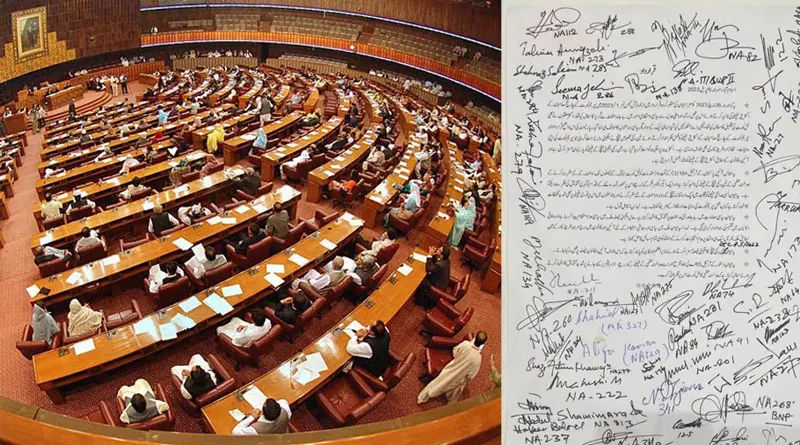National Assembly resolution binds PM, cabinet not to implement SC verdict
ISLAMABAD: The National Assembly on Thursday passed a resolution rejecting the three-member Supreme Court bench’s “minority” verdict on the Punjab elections and made it binding on Prime Minister Shehbaz Sharif and his cabinet not to implement the decision.
The resolution was moved by Balochistan Awami Party lawmaker Khalid Magsi and approved by a majority of the lawmakers.
It noted that the National Assembly on March 28 in a resolution had called on the Supreme Court to avoid “interfering” in political matters. It also observed that multiple sections of the society had repeatedly urged the apex court to form a full court bench but their calls were ignored and only one political party was heard in the case.
“Completely ignoring the clear resolution of the Parliament and the majority decision of the four judges of the Supreme Court, the three-member special bench enforced a minority opinion, which is a violation of the traditions, precedents and procedures of the Supreme Court,” noted the resolution. It added that a minority was imposed on the majority.
The resolution also expressed concerns over the Supreme Court’s circular setting aside the verdict of a three-member bench on suo motu cases. It also raised alarms over the formation of a controversial bench and its decision to quickly close the case that prompted Justice Qazi Faez Isa to suspend “suo motu” hearings.
The lower house of Parliament also aired fears over the “undue judicial interference in political matters”. It also pointed out that the “minority ruling” had given rise to political instability and paved the way for divisions in the federal units.
“This House considers the holding of general elections at the same time throughout the country as per the prevailing procedure mentioned in the constitution and law for political and economic stability in the country as the solution to all the problems,” noted the resolution.
The resolution also demanded the formation of a full court to review the “wrong interpretation” of Article 63-A.
‘Collective contempt of court’
Pakistan Tehreek-e-Insaf (PTI) lawmaker Mohsin Leghari, while opposing the resolution, warned that the House was treading on a dangerous path, and asked: “Are we committing contempt of court?”
“The Constitution prohibits speaking against the judiciary in the House,” the PTI leader maintained. He added that in passing the resolution, the House was “collectively committing contempt of court.”
He further warned that a “war” with the Supreme Court would be “very dangerous” and said that a resolution, such as the one tabled should be passed after rational consideration and not under the flow of passion.
He defended the SC’s move on the Punjab elections and said that the apex court had announced for elections to be held within 90 days since that was instructed by the Constitution, and expressed concern that 90% of the actions of the House were based on criticising PTI Chairman Imran Khan.
“Even though Imran is not in the House, he is on everyone’s minds” Legahri declared, as other members of PTI protested against the resolution.
He further took issue with the “fact” that the before carrying out a vote, the PTI was not given an opportunity to speak and present its case.
“Even when the opposition is opposed, it is given an opportunity to speak,” Leghari said.
“My daughter used to have pretend tea parties when she was younger. Of course, there wasn’t any actual food, but we went through the motions and pretended. similarly, we should at least be allowed to go through the motions of democracy and be permitted to speak.”

